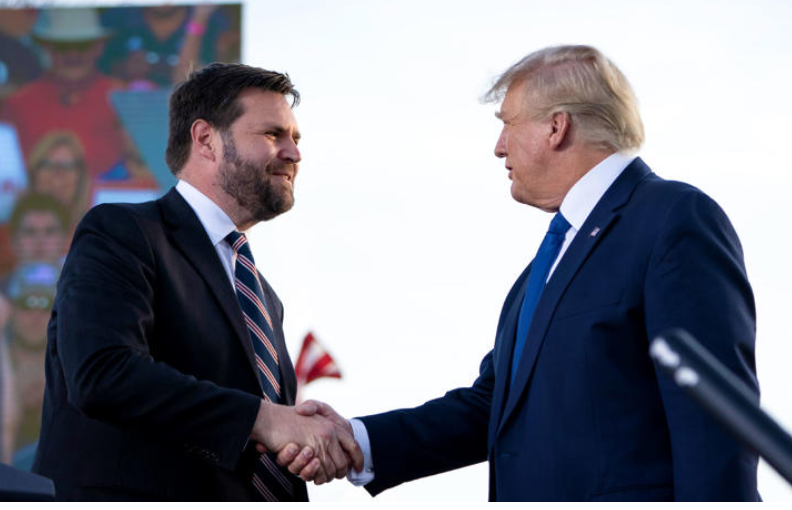Table of Contents

sub Title: ABC Host Abruptly Ends Interview with J.D. Traders: A Deep Dive into the Controversial Remarks on the Supreme Court
Introduction
In the world of news and politics, interviews play a crucial role in shaping public opinion and providing insight into the thoughts and perspectives of prominent figures. Recently, an incident caught the attention of many when ABC News host George Stephanopoulos abruptly ended an interview with J.D. Vance, a Republican senator from Ohio. The catalyst for this unexpected termination was Vance’s controversial remarks about the Supreme Court.
This incident has sparked debates and discussions about the limits of political discourse, the role of media in shaping public opinion, and the responsibilities of public figures in expressing their views. In this article, we will delve into the details of the interview, analyze the statements made by J.D. Vance, and explore the broader implications of such incidents in the realm of journalism and politics.
The ABC Interview: An Overview
The interview in question took place on ABC News, where George Stephanopoulos engaged in a conversation with J.D. Vance. The discussion revolved around various political topics, but it took a dramatic turn when Vance made statements that were perceived as controversial, particularly regarding the Supreme Court. According to the available information, Vance suggested that a sitting president could potentially have the power to ignore decisions made by the Supreme Court. This assertion raised eyebrows and prompted the host, George Stephanopoulos, to terminate the interview abruptly.
The Controversial Remarks
To understand the gravity of the situation, it is essential to examine the specific remarks made by J.D. Vance during the interview. According to reports, Vance posited the idea that a president might possess the authority to disregard rulings from the highest court in the land. This assertion goes against the traditional understanding of the balance of powers in the United States, where the three branches of government – legislative, executive, and judicial – are intended to operate independently to ensure a system of checks and balances.
Vance’s remarks open up a broader discussion about the limits of executive power, the sanctity of the Constitution, and the potential implications of such statements coming from a sitting senator. It is crucial to analyze whether Vance’s comments were a genuine expression of his beliefs or if they were made for political posturing, considering the charged nature of the topic.
Media’s Role in Shaping Public Opinion
The incident raises questions about the role of media in shaping public opinion and holding public figures accountable for their statements. George Stephanopoulos’ decision to abruptly end the interview reflects a stance on maintaining journalistic integrity and not providing a platform for statements that could be considered dangerous or unconstitutional.
Media outlets play a pivotal role in disseminating information to the public, and their editorial decisions can influence the way events are perceived. In this case, ABC News took a clear stand by discontinuing the interview, signaling that certain lines should not be crossed in the realm of political discourse. However, this also sparks a debate about whether such editorial decisions could be perceived as biased and whether they limit the audience’s access to diverse perspectives.
The Responsibility of Public Figures
Public figures, especially elected officials, bear a significant responsibility in how they express their views and opinions. The controversy surrounding J.D. Vance’s remarks underscores the importance of careful and considered communication by those in positions of power. Elected officials are expected to uphold the principles of the Constitution and demonstrate a nuanced understanding of the separation of powers.
The question arises whether Vance’s statements were an isolated incident or indicative of a broader trend in political discourse. Are politicians increasingly willing to challenge established norms and constitutional principles for political gain? Understanding the motivations behind such statements is crucial in assessing their impact on public trust and the democratic process.
Implications for the Supreme Court
The Supreme Court, as an institution, plays a vital role in upholding the rule of law and interpreting the Constitution. Vance’s suggestion that a president could potentially ignore Supreme Court decisions raises concerns about the erosion of the judiciary’s independence. The incident prompts a closer examination of the delicate balance between the executive and judicial branches and the potential consequences of undermining the authority of the highest court in the land.
Legal scholars and constitutional experts may weigh in on the implications of Vance’s remarks for the rule of law and the functioning of the American democratic system. It is essential to explore whether such statements could set a precedent or if they are likely to be dismissed as isolated rhetoric with no real impact on legal and political norms.
Public Reaction and Political Fallout
The public reaction to the abrupt end of the interview and Vance’s controversial remarks is a key aspect of this unfolding story. Social media platforms and news outlets have likely been flooded with opinions, analyses, and reactions from various segments of society. Understanding how the public perceives such incidents is crucial in gauging the potential political fallout for J.D. Vance and his party.
Moreover, the incident may have broader implications for the Republican Party as a whole. Do Vance’s remarks align with the party’s overall stance on the separation of powers, or is this an isolated viewpoint? Examining the responses of other Republican leaders and party members will provide insight into whether Vance’s comments are reflective of a larger ideological shift within the party.
The Future of Political Discourse
The ABC interview incident raises questions about the state of political discourse in the United States. Are politicians increasingly adopting confrontational and controversial stances to garner attention and support? Does this trend contribute to the polarization and division within the political landscape? Understanding the dynamics at play in political communication is essential in assessing the health of democratic institutions and the potential for constructive dialogue.

Journalistic Ethics and Editorial Decisions
George Stephanopoulos’ decision to abruptly end the interview with J.D. Vance is a notable example of a journalist taking a stand against what they perceive as irresponsible or dangerous statements. This incident sparks a broader conversation about journalistic ethics and the responsibility of media outlets in shaping public discourse.
Journalists walk a fine line between providing a platform for diverse voices and preventing the dissemination of harmful or misleading information. The decision to terminate an interview is not taken lightly, and it raises questions about the criteria for such editorial decisions. Is it the duty of journalists to challenge controversial statements in real-time, or should they allow public figures to express their views freely, trusting the audience to discern the validity of those views?
Conclusion
The ABC News interview with J.D. Vance, which ended abruptly due to his controversial remarks about the Supreme Court, has ignited a firestorm of debate and discussion. This incident touches on various aspects of American politics and society, from the responsibilities of public figures to the role of media in shaping public opinion. The implications of Vance’s statements on the separation of powers, the functioning of the Supreme Court, and the future of political discourse are significant and warrant careful consideration.
As the story continues to unfold, it is essential to monitor public reactions, political fallout, and the broader impact on democratic institutions. The incident serves as a reminder of the delicate balance required in maintaining a healthy democracy, where open dialogue coexists with respect for constitutional principles. Ultimately, the ABC interview with J.D. Vance will be remembered as a pivotal moment in contemporary American politics, prompting reflection on the state of the nation’s democratic ideals and the role of key players in shaping its future.
